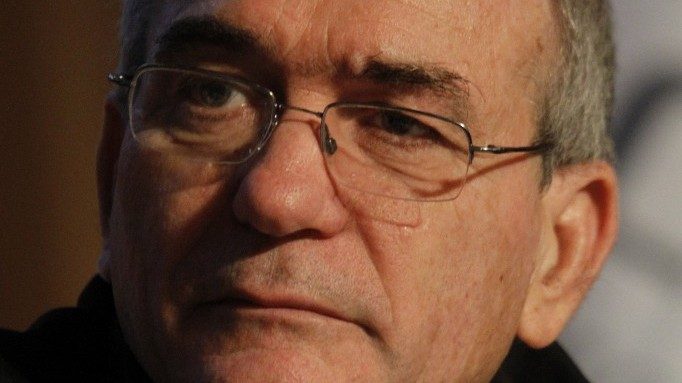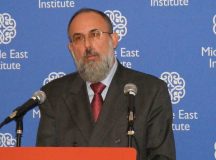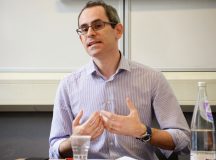Brig. Gen. (res.) Yossi Kuperwasser was chief of the research division in IDF Military Intelligence, and until recently, director general of the Ministry of Strategic Affairs. He is now the Director of the Project on Regional Middle East Developments at the Jerusalem Center for Public Affairs. In this interview with Fathom assistant editor Sam Nurding, he challenges the idea that Israel is no longer committed to the two-state solution. This is to radically misread the reasons for the failure of previous negotiations, he claims, missing the baleful role of both the Palestinian commitment to a maximalist narrative that recognises neither the Jewish people nor the legitimacy of the Jewish state and of its campaign of incitement which poisons the minds of the Palestinian people. Suggesting that the international community, and not only Trump, is now beginning to understand this, as well as the need to apply pressure to encourage change, he argues that ‘if the Palestinians would change this narrative, Israel would be more than happy to find a solution’.
Israel and the Palestinians: partners for peace?
Sam Nurding: You wrote in May that there is no Palestinian peace partner for Israel, and you gave a variety of reasons which many would agree with. What would you say to those of our readers who are sceptical that the current Israeli government represents a viable peace partner for the Palestinians?
Yossi Kuperwasser: First of all, there is an Israeli partner for peace. Israel has repeatedly said it is interested in peace negotiations and that it is ready to make painful concessions in the interest of peace. Prime Minister Benjamin Netanyahu has repeatedly said in the context of peace that there is going to be a Palestinian entity that will be called a state, but he acknowledges that there has to be some limitations.
SN: A ‘state-minus’?
YK: Something like that, yes. But we have to realise this cannot happen before the Palestinians make some substantial changes to their narrative. As long as the narrative of the Palestinians espouses a commitment to all of Palestine, it is clear they continue to refuse to accept Israel as the nation state of the Jewish people. Likewise, if they continue to regard terrorism as heroism, then there remains a serious issue to address. I think the message the Palestinians are getting now, more clearly than before, is that this strange narrative is unhelpful and must be reconsidered.
The absence of peace is not because Israelis don’t want peace; Israelis are more than eager to have peace. But Israelis understand that there cannot be peace as long as the other side refuses to change its position. In Israel there are all kinds of people who are not interested in a peace solution, but the vast majority of Israelis are in favour.
SN: Many of those people are in the current government; Education Minister Naftali Bennett has said he doesn’t want a Palestinian state.
YK: Yes, but when these people say ‘we don’t want a Palestinian state’ what they are actually saying is: ‘We don’t believe the Palestinians are going to change their narrative. And as long as the Palestinians don’t change their narrative we don’t want a Palestinian state, because it is going to constitute a threat to Israel.’
If there was a change in the Palestinian narrative, for example if the Palestinians – now under pressure on the issue of the salaries to terrorists – cancelled the law of 2004 according to which salaries are paid to terrorists, and stopped calling terrorists the fighting sector of their society, Israelis would see this as a wonderful move and be more forthcoming on the issue of peace.
The Palestinian narrative says there is no such thing as a Jewish people, and because of this, Palestinians argue that Jews should not be allowed a state of their own under the principle of national self-determination. If the narrative was changed, and Palestinians recognised that there is a Jewish people, so they must be allowed a state of their own under the principle of national self-determination, with full civil rights for minorities, then many Israelis would change their mind about the viability of the peace process and the Palestinian partner for peace.
Prospects for negotiations would be improved further if the Palestinians said that they accepted the Jews as a people with historical connection to Palestine, and that this explains not only why they are entitled to self-determination, but why this self-determination should be realised in the ancestral homeland of the Jewish people. Palestinians should reach the conclusion that we have to share the land somehow, acknowledging that the Jews have a just cause.
Conversely, what we have seen today is that the Palestinians are trying to force UNESCO to adopt resolutions that say that the Jews have nothing to do with Jerusalem, and that the Jews don’t have any claim on the Patriarch’s Tomb in Hebron. When this happens, it is very easy to understand why Israelis tend to say: ‘Why should we allow these people, who don’t want us to live here, have a state that would be used by them to promote their current narrative?’
‘Incitement’ is the broad effort to incubate in the hearts and in the minds of Palestinians the following elements of the Palestinian narrative: That there is no Jewish people, that Jews don’t have any sovereign connection to the land of Israel, that Jews are a problematic people that should be demonised, that Israel is an apartheid state, that the struggle against Zionism should continue until the end of Zionism and that any kind of activity to these ends is justified, including terrorism. This narrative justifies the Palestinians paying salaries to terrorists and considering terrorists to be heroes.
Moreover, in this narrative, the war against Zionism is against all expressions of Zionism. Not only in the 1967 lines, but also the 1948 lines. The Palestinians are still fighting the 1948 war. The Palestinians realise now that they cannot get the 1948 territories, and this is why they say to the international community that they are ready to negotiate for the 1967 territories. However, they want these territories without indicating any readiness to give up their claim to the 1948 territories. That’s why they continue to speak of the right of return.
All these aspects of the Palestinian narrative are integrated with the view that Palestinians are the only victims in this conflict, and Jews do not constitute victims even if they are killed in terrorist attacks. The Jews cannot be victims and cannot complain about being attacked because they insist on living here; that’s the attitude. And this perspective is supplemented by the idea that the fight in Israel is based on Islamic grounds.
When you take all of this together you begin to understand why some Israelis are, at this point in time, against the creation of a Palestinian state. It’s not that they don’t want a Palestinian state in any conditions. If the Palestinians would change this narrative, Israel would be more than happy to find a solution that satisfied the revised Palestinian aspirations.
Is the status quo sustainable?
SN: Naftali Bennett said at a recent conference that when something is unsolvable, you need to manage it. But is it possible for Israel to manage the conflict in the long term, given the international consensus that there should be two states and that Israel should not be in the West Bank?
YN: I think Israel can manage the situation for a long time. The stupidest thing for us would be to insist on moving away from an unpleasant status quo to another status quo that is even worse. There is not much sense to all the ideas of unilateral moves that would give something to the Palestinians and enable them to carry out attacks from a better striking position. We have to do things that would improve the situation, not just to do something for the sake of doing it. We can manage the current situation. To say the situation is unsustainable is wrong. It is sustainable. It’s not in the benefit of anybody to have it sustained, but as long as nobody offers a preferable alternative, it is sustainable, and we will sustain it.
Importantly, what people fail to understand is that the reason the Palestinians have not changed their narrative – and the reason why there is no progress for peace – is because the Palestinians have never felt that there is an international expectation or pressure for them to change their narrative. They feel that they can cheat the world again and again because the international community doesn’t invest the time needed to really study the issue.
Where you can see this clearly is in the suppression of the two-state solution. Everybody speaks about the two-state solution. When the Palestinians speak about the two-state solution, they mean a Palestinian state (Palestine), and a state without an ethnic identity (Israel). Or, if they are pushed, they say Israel will be the state of the ‘Israeli people,’ a term they have invented which includes all the people, be they Jews or Arabs. In short, not the state of the Jewish people, not a Jewish homeland with full civil rights for minorities, because as I said before, according to them there is no Jewish people. When they say two-state solution this is what they mean.
When Israel says two-state solution, we mean two states for two peoples. One of them is the state of the Palestinian people, and the other is the nation state of the Jewish people. With mutual recognition, so that the Palestinians accept us as the nation state of the Jewish people; otherwise, they remain committed to the idea that eventually they will return to Haifa and Jaffa.
The international community is vague on this issue. It speaks about a two-state solution without really going into the question of what the two states will be. For the international community it is obvious that Israel is the nation state of the Jewish people, so the mantra is that ‘there is no need to clarify and repeat this’. But it has to be said, or the Palestinians will continue to believe they have successfully misled the world on this.
I think the Americans in the last 25 years have started to acknowledge this problem, and have started to remind the Palestinians that Israel will be a Jewish state. Even John Kerry understood it, and included this in his six points. And this was the reason why Abbas refused President Barak Obama’s offer. Abbas was presented with Kerry’s six points, and there is this myth that he didn’t respond to Obama’s offer. He did respond! He stood in Ramallah and he explained his response: that they would remain committed to no Jewish state, and committed to Safed, and Haifa, and Jaffa. And the crowd shouted: ‘Israel should know that there is no substitute for the right of return.’
The Palestinians realised what the US was getting at. Yes, it was really the feeblest way of expressing the idea that the Palestinians should accept Israel as the nation state of the Jewish people, by the way, but the Palestinians still refused to agree to it because they didn’t feel that there was any pressure behind it. Ultimately, they were right. They did not face any pressure from the Americans; on the contrary, Israel faced US pressure in the form of the Americans allowing UN Resolution 2334 to pass in the UN Security Council. Given this, why would the Palestinians change their narrative?
Times may be changing, and now there is a golden opportunity to make progress on this front because the new administration in the US is willing to speak a different language to the Palestinians and the US Congress is discussing the Taylor Force Act[1]. Also, because the Knesset is moving forward with a law that calls upon Palestinians to stop paying salaries to terrorists, otherwise Israel will deduct it from the money it transfer to them.
The Taylor Force Act and Commanders for Israel’s Security
SN: I’m sure you saw that recently the Commanders for Israel’s Security sent a letter saying that while they supported the aim of the Taylor Force Act, they believed that the legislation needs to be changed to avoid a situation in which the PA loses money earmarked for security coordination and economic and social projects between the PA and Israel. Do you think the act should be changed?
YN: I am a ‘commander for the security of Israel’ just as much as the people in this group. I think people should be very cautious with the names they take for themselves. All the commanders of Israel are for Israeli security, not just this group. I strongly oppose what they say. What they say is that regardless of what the Palestinians are doing, no pressure will be brought to bear on them. I do not see the logic in this. Are we going to allow them to continue taking the money we give them in order to keep paying the terrorists who kill us? It is self-defeating to succumb in the face of terror.
On the contrary, I believe that pressure must be put on the Palestinians on this issue. Only if the Palestinians feel pressure will they consider changing their policy. I think that this declaration is totally wrong in its understanding of the reasons that have led to the cooperation between us and the Palestinian security forces. The PA is not doing it because they get money; it is doing it because it’s in the PA’s own interest to do so. The cooperation is about stopping terrorist attacks from Hamas. The Palestinians are more afraid of Hamas then we are. We can lose people, but they can lose their control of the West Bank. They fight against Hamas because it is in their interest, not because someone gives them money for it. So, at best, this way of thinking is ridiculous, if not self-defeating.
I am working with colleagues to issue a counter-declaration because people have to understand that the aforementioned letter is not the unanimous opinion of ex-Israeli commanders. There are many commanders who think differently.
Trump and the Palestinian narrative
SN: You mentioned earlier about how a new US administration has taken a different line with the Palestinians. Overall, what have you made of US President Donald Trump team’s handling of the conflict?
YK: In every beginning there is a new hope. And then, during the learning process, many of these initial hopes become tempered as a more realistic understanding is arrived at. I think, as President Trump has said many times, that he is committed to promoting peace between Israel and the Palestinians, as every US president has been upon arriving in office. He thought that this was something that had to be dealt with, that he could make happen and that it’s going to enable him to make the world a better place. And who doesn’t want that?
Trump is trying to detach himself from the conventional wisdom. As Albert Einstein said: ‘If you do the same thing and you fail, then you try it again expecting a different outcome, you’re stupid!’ So Trump is trying something new. This new approach has two elements. Firstly, not imposing a specific solution on the two sides. His approach is to bring the sides together to discuss their issues and try to reach an agreement. If they need assistance on the way, he’s going to provide them with assistance, but he’s not going to say you need to do this or that.
The previous administration was deeply involved in the details, and this made it very difficult. They were trying to actually form the agreement by themselves. There was this feeling along the way that the Obama administration was more committed to the agreement than the sides themselves, which made it very difficult for them to promote it, because it made them vulnerable. So Trump is trying to adopt a different approach, which could be summarised as: I am interested in peace, but I cannot be more interested in the peace than you are. I don’t care what kind of peace you reach as long as you reach a peace agreement.
The second element is that Trump is the first person who is ready to consider challenging the Palestinian narrative. The Palestinian narrative was the main obstacle, if not the only obstacle, to reaching peace since this narrative was shaped back in the 1920s. He is the first one who is trying to say, ‘Let’s not try to make peace with this narrative, let’s try to change this narrative and then make peace.’ This is key to the success of Trump’s peace agenda. If he manages to get the Palestinians to change their narrative, then he doesn’t have to worry about Israel, because once Israel sees that the Palestinians have changed their narrative it will be easy for Israel to move forward.
The problem is whether he is actually going to be able to convince the Palestinians to change. Here, he has taken upon himself an immensely challenging task. The first reaction from the Palestinians has of course been a refusal. However, that is to be expected because the Palestinians believe that just like in the past no real pressure will be put on them. Therefore, we will have to wait and see if real pressure is put on them or not.
This will only work if Trump’s words are translated into real action, like the Taylor Force Act or the legislation that is now in the Knesset.
The UK could also do something. It has already started paying aid money directly to nurses and the teachers so that the PA cannot use the money for salary payments to terrorists. This is progress, but all it has done is made the PA use other money for this purpose. If the UK also threatened to withhold money, like Denmark and Holland did, the PA may recognise a new situation has developed and that their behaviour must be reconsidered. By doing this, states contribute to the peace process much more than by caressing and hugging the PA. As long as states allow Palestinians to speak about two states without saying what the other state is, and as long as states let them pay salaries to terrorists and don’t punish them, then they will stick to their narrative. We have to put real pressure on the PA. They may decide not to change their narrative. There is a real possibility Trump could fail. I saw in Al-Hayat (London-based pan-Arab daily newspaper) recently that ‘Trump has already decided. There is no way we will get milk from this goat’.
SN: Can Israel take some immediate steps to stabilise the situation?
YK: Israel can look at ways it can improve living conditions for the Palestinians without changing the core of the situation. But in this case the Palestinians should know they will not get a state, just a little bit of improvement here and there.
On the improvements, I think we are making another mistake. I am totally in favour of building around Qalqilya and letting the Palestinians have a better life. But the real problem is that there are still people living in poor conditions in what people term the ‘refugee camps’. They are not exactly refugee camps, but refugee centres. And many of the villages are in relatively poor conditions. If the Palestinians want to improve housing conditions this should be the first concern, not the well-being of the rich people in Qalqilya who want to have nicer houses.
First, let’s build for the refugees. The people in the Balata or Askar refugee camps are the people who came from Jaffa in 1948, waiting to go back to Jaffa. The problem is they are not going to be able to come back to Jaffa. In light of this, instead of keeping them living in poor conditions, Israel should give them a chance in Area C, around Nablus, or if they want, to live in Qalqilya and enable those refugees to improve their living conditions. What is happening right now is that the Palestinians and the international community are abusing these people – keeping them in those centres and forcing them to live in poor conditions based on the assumption that one day they will come back to Jaffa. Why torture them? These people should be the first people to get better living conditions.
Of course, the refugee issue is sensitive. So we eternalise the problem of these poor people. The young people that are born in the camps are definitely not going to accept a change in the Palestinian narrative as they feel the suffering every day. We should let them have a better life, better opportunities, and better education. These people should be the priority, and not the rich people of the West Bank.
[1] The Taylor Force Act is a legislative bill in the US Senate that proposes to stop American economic aid to the PA until the PA changes its laws to cease paying stipends funnelled through the Palestinian Authority Martyr’s Fund to individuals who commit acts of terrorism and to the families of deceased terrorists. On 3 August 2017 the bill advanced through the Senate Foreign Relations Committee on a 17-4 vote.






































Comments are closed.